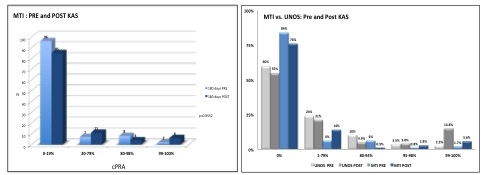Impact of the New Kidney Allocation System on Highly Sensitized Patients: Single Center Report.
1Department of Medicine, Division of Nephrology, Miami Transplant Institute, Miami, FL
2Department of Surgery, Miami Transplant Institute, Miami, FL.
Meeting: 2016 American Transplant Congress
Abstract number: C69
Keywords: IVIG, Kidney transplantation, Sensitization
Session Information
Session Name: Poster Session C: Economics, Public Policy, Allocation, Ethics
Session Type: Poster Session
Date: Monday, June 13, 2016
Session Time: 6:00pm-7:00pm
 Presentation Time: 6:00pm-7:00pm
Presentation Time: 6:00pm-7:00pm
Location: Halls C&D
Background: Highly sensitized patients (HSP) with calculated Panel Reactive Antibody (cPRA) >80% are known to have extensive waiting time on UNOS list. The new kidney allocation system (KAS) was implemented to expand the pool of donors and improve their access to transplant. We use IVIG based desensitization.
Aim: To evaluate the impact of the new KAS in the HSP and to compare with the UNOS 6 months report data.
Methods: We analyzed all patients transplanted in our center with deceased donors (DD) 180 days before (PRE) and after (POST) the KAS was implemented and divided them in categories based cPRA.
Results: 113 DD were transplanted PRE and 106 POST. 10 in each group were HSP: 8 vs. 4 with cPRA 80-98%, 2 vs. 6 with >98% cPRA. Of those, 40% (4/10) in PRE and 50 % (5/10) in POST received desensitization resulting in ≥ 15 % DSA reduction at the time of transplant when compared with historical samples of 34% and 26%, respectively. All 3 HSP in the PRE group that had DSA had received IVIG vs. 3 of 6 HSP in POST group.
There were no statistical significance in age, gender, blood group type, % of cPRA, presence of DSA, local vs. imported organ, HLA missmatch, or use of desensitization, except in recipient race with 45 (40%) African–Americans (AA) in PRE vs. 69 (65%) in POST (p=0.0002).

Conclusions: In our center, the rate of transplants in HSP has improved almost across all levels of cPRA, with AA recipients who significantly benefited from the new KAS similar to the trend reported by UNOS. Overall, with the use of desensitization, the new KAS appears to have no significant impact in HSP with cPRA >95% giving disadvantages to the 80-94% cPRA group. Further analysis will be needed over time.
CITATION INFORMATION: Mattiazzi A, Kupin W, Roth D, Chen L, Burke G, Ciancio G, Ruiz P, Vianna R, Guerra G. Impact of the New Kidney Allocation System on Highly Sensitized Patients: Single Center Report. Am J Transplant. 2016;16 (suppl 3).
To cite this abstract in AMA style:
Mattiazzi A, Kupin W, Roth D, Chen L, Burke G, Ciancio G, Ruiz P, Vianna R, Guerra G. Impact of the New Kidney Allocation System on Highly Sensitized Patients: Single Center Report. [abstract]. Am J Transplant. 2016; 16 (suppl 3). https://atcmeetingabstracts.com/abstract/impact-of-the-new-kidney-allocation-system-on-highly-sensitized-patients-single-center-report/. Accessed July 12, 2025.« Back to 2016 American Transplant Congress
